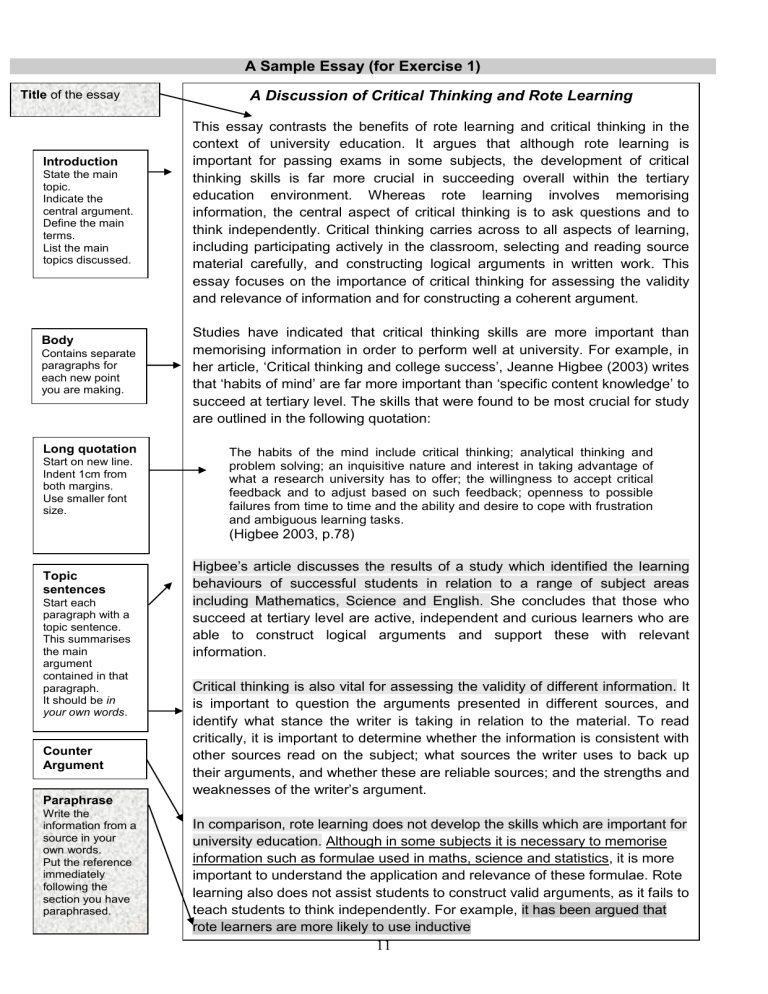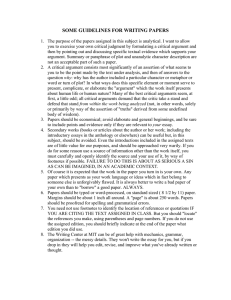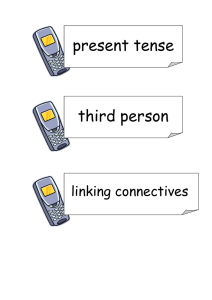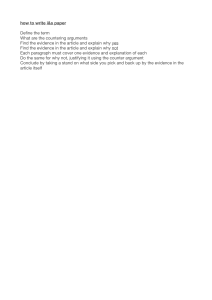
A Sample Essay (for Exercise 1) Title of the essay Introduction State the main topic. Indicate the central argument. Define the main terms. List the main topics discussed. Body Contains separate paragraphs for each new point you are making. Long quotation Start on new line. Indent 1cm from both margins. Use smaller font size. A Discussion of Critical Thinking and Rote Learning This essay contrasts the benefits of rote learning and critical thinking in the context of university education. It argues that although rote learning is important for passing exams in some subjects, the development of critical thinking skills is far more crucial in succeeding overall within the tertiary education environment. Whereas rote learning involves memorising information, the central aspect of critical thinking is to ask questions and to think independently. Critical thinking carries across to all aspects of learning, including participating actively in the classroom, selecting and reading source material carefully, and constructing logical arguments in written work. This essay focuses on the importance of critical thinking for assessing the validity and relevance of information and for constructing a coherent argument. Studies have indicated that critical thinking skills are more important than memorising information in order to perform well at university. For example, in her article, ‘Critical thinking and college success’, Jeanne Higbee (2003) writes that ‘habits of mind’ are far more important than ‘specific content knowledge’ to succeed at tertiary level. The skills that were found to be most crucial for study are outlined in the following quotation: The habits of the mind include critical thinking; analytical thinking and problem solving; an inquisitive nature and interest in taking advantage of what a research university has to offer; the willingness to accept critical feedback and to adjust based on such feedback; openness to possible failures from time to time and the ability and desire to cope with frustration and ambiguous learning tasks. (Higbee 2003, p.78) Topic sentences Start each paragraph with a topic sentence. This summarises the main argument contained in that paragraph. It should be in your own words. Counter Argument Paraphrase Write the information from a source in your own words. Put the reference immediately following the section you have paraphrased. Higbee’s article discusses the results of a study which identified the learning behaviours of successful students in relation to a range of subject areas including Mathematics, Science and English. She concludes that those who succeed at tertiary level are active, independent and curious learners who are able to construct logical arguments and support these with relevant information. Critical thinking is also vital for assessing the validity of different information. It is important to question the arguments presented in different sources, and identify what stance the writer is taking in relation to the material. To read critically, it is important to determine whether the information is consistent with other sources read on the subject; what sources the writer uses to back up their arguments, and whether these are reliable sources; and the strengths and weaknesses of the writer’s argument. In comparison, rote learning does not develop the skills which are important for university education. Although in some subjects it is necessary to memorise information such as formulae used in maths, science and statistics, it is more important to understand the application and relevance of these formulae. Rote learning also does not assist students to construct valid arguments, as it fails to teach students to think independently. For example, it has been argued that rote learners are more likely to use inductive 11 Short quotation Use inverted commas around the words copied from the source. commas around the Conclusion Restate the main argument. words copied Summarise the main points used from theyour to support argument. Make a final source. statement. fallacies, in which case their reasoning will not be sound (Sternberg 2004). These fallacies include the ‘ad populum’ argument in which the reason given for the conclusion is that the majority of people agree with it. Sternberg writes that ‘the essence of this fallacy lies in our need to conform to popular views and conclusions’ (2004, p. 69). Critical thinking, on the other hand, enables students to construct logical arguments, which is essential to all university work. In conclusion, although rote learning is necessary in some situations, it is far more important to develop critical thinking skills in order to succeed at university level. The skills involved in thinking critically and analytically can assist students to construct sound arguments and to assess their reading material in terms of the validity of its content. Whereas memorising information has limited value in terms of university education, critical thinking is one of the most crucial aspects of university study. Reference List Reference List Start this on a new page. Give the full details of all sources you have referred to in your essay. Format using the Harvard System of Referencing. Higbee, J 2003, ‘Critical thinking and college success’, Research & Teaching in Developmental Education, vol. 20, no. 1, pp.77-82 (online ProQuest). Sternberg, RJ 2004, ‘Four alternative futures for education in the United States: it’s our choice’, School Psychology Review, vol. 33, no. 1, pp. 67-78 (online ProQuest). STYLE TIPS Make sure your writing flows. Once you have written a draft of your essay, check that the paragraphs are ordered in a logical way. Read over the topic sentences: do they follow a logical sequence? Always write in the third person. Do NOT use: I, my, me, we, our, us, you, or your. Use the present tense when you are writing about other people’s work, such as, “Johnson points out that…” or “Studies indicate that….” Do NOT start paragraphs with quotations. Write topic sentences. Always use gender neutral language: he/she, their, the author, the researcher, and so on. Use formal language: Do NOT use words such as “things”! Be specific! Use the passive voice. Make appointments with staff at Academic Learning Support to get extra help with your essays! 12




